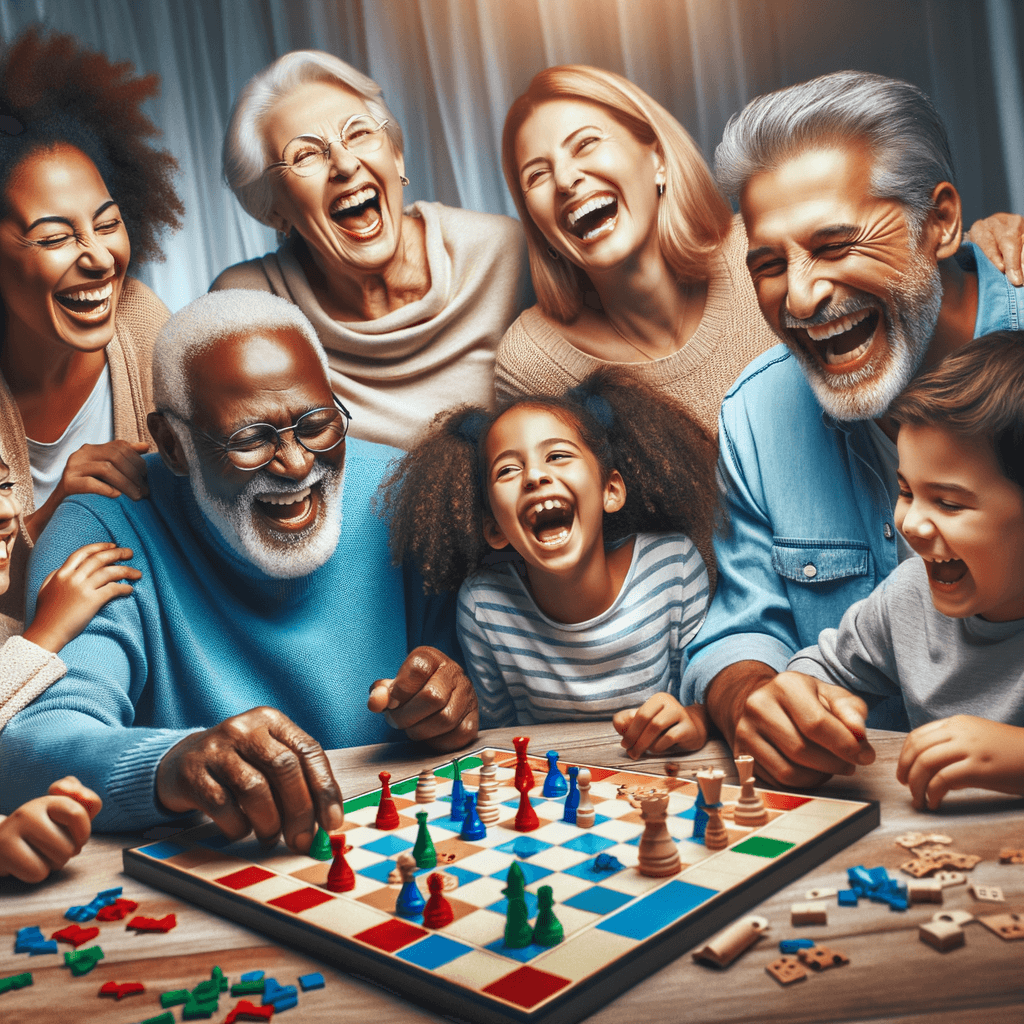Introduction: The Magic of Board Games for All Ages
Welcome, game lovers! Today, we’re going to dive into the world of board games. These aren’t just any games, but games that bring together people of all ages. From your little brother to your grandma, everyone can join in the fun. So, let’s roll the dice and start our journey!
- The timeless appeal of board games
Board games have been around for thousands of years. From ancient games like Senet in Egypt to modern classics like Monopoly, they’ve always been a hit. Why? Well, they’re fun, of course! But there’s more to it than that. Board games challenge our minds. They make us think, plan, and strategize. They also teach us how to win and lose gracefully. And the best part? You can play them over and over again, and they never get old. Here’s a cool link to learn more about the history of board games.
- Intergenerational bonding through board games
Board games aren’t just about fun and games. They’re also about bringing people together. When families play board games, they’re not just playing. They’re bonding. They’re laughing, talking, and creating memories. Board games break down the barriers between generations. They allow grandparents to share their wisdom and experiences with their grandchildren. And they give kids the chance to teach their elders a thing or two about the latest games. It’s a win-win situation for everyone!
So, the next time you’re looking for something to do with your family, why not break out a board game? You’ll have a blast, and you’ll be creating precious memories at the same time. Stay tuned for more on this magical world of board games for all ages!

The History of Intergenerational Board Games
Board games have been a part of human culture for thousands of years. They’ve brought families together, taught us about strategy, and even helped us learn about different cultures. Let’s dive into the history of these amazing games!
- Early origins of board games
The history of board games goes way back. The earliest known board games were discovered in the tombs of ancient Egypt. One of the most famous of these is Senet, a game that was played over 5000 years ago. It was a game of strategy and luck, much like many of the games we play today.
Board games were not just limited to Egypt, though. In ancient India, a game called Pachisi was popular. This game is considered the ancestor of modern games like Ludo and Parcheesi.
Even in the Americas, Native American tribes played board games. They used materials like sticks, stones, and bones to create their games. These games were often part of important ceremonies and traditions.
- Evolution into family friendly board games
As time went on, board games started to change. In the 19th century, board games became more family-friendly. This was a time when families started to have more leisure time. Parents were looking for ways to entertain their children and teach them important lessons at the same time.
The first board game to be sold commercially was The Checkered Game of Life, created by Milton Bradley in 1860. This game was designed to teach children about the ups and downs of life. It was a huge success and paved the way for the board games we know and love today.
Since then, board games have continued to evolve. Today, there are thousands of different board games available. They range from simple games for young children to complex strategy games for adults. But no matter the type, the goal is always the same – to bring people together and have fun!
Benefits of Playing Family Board Games
Board games aren’t just for fun, they’re also great for your brain! Let’s take a look at some of the benefits kids can get from playing board games with the family.
For Kids
Kids can get a lot out of a good board game. Here are just a couple of the benefits:
- Development of cognitive skills: Playing board games can help kids develop important cognitive skills. This includes problem-solving, decision making, and critical thinking. For example, in a game like chess, kids have to think several moves ahead and make strategic decisions. This can help improve their ability to think logically and strategically. Plus, it’s a lot of fun!
- Improvement in social skills: Board games are also a great way for kids to improve their social skills. They learn to take turns, play fair, and communicate with others. In a game like Monopoly, for instance, kids have to negotiate with other players and make deals. This can help them learn how to interact with others in a positive and respectful way.
So, the next time you’re thinking about what to do on a rainy day, why not break out a board game? It’s a fun way to spend time together as a family, and it’s also good for your kids’ brains!
For Adults and Elderly
Board games aren’t just for kids, you know! Adults and the elderly can also reap a ton of benefits from joining in on the fun. Let’s dive into some of the key perks.
-
- Mental Stimulation and Memory Enhancement
Ever heard of the phrase “use it or lose it”? It applies to our brains too! Engaging in board games can provide a great mental workout. They challenge our minds, helping to keep our cognitive abilities sharp. Studies have shown that board games can even help enhance memory and delay the onset of dementia in older adults. So, next time you play a game of chess or Scrabble, remember, it’s not just fun, it’s brain-boosting too!
-
- Social Interaction and Bonding
Playing board games is a fantastic way to spend quality time with friends and family. It encourages conversation, laughter, and bonding. For the elderly, who may often feel isolated or lonely, board games can provide a much-needed social outlet. Plus, it’s a great way to bridge the generation gap and create lasting memories with grandchildren. After all, nothing beats the joy of a shared victory or the camaraderie of a friendly competition!
So, whether you’re an adult looking for a fun way to unwind or an elderly person seeking to stay mentally active and socially connected, board games are a great option. Go ahead, roll the dice, and let the good times roll!
Popular Board Games for All Ages
Board games are a fantastic way to bring people of all ages together. Whether you’re a kid, a teenager, an adult, or a senior, there’s a board game out there for you. Let’s take a look at some of the most popular board games that everyone can enjoy.
-
- Chess
Chess is a classic game that’s been around for centuries. It’s a two-player strategy game that’s all about outsmarting your opponent. Each player starts with 16 pieces: one king, one queen, two rooks, two knights, two bishops, and eight pawns. The goal is to checkmate your opponent’s king. This means the king is in a position to be captured (in “check”) and there is no way to move the king out of capture (mate). Learn more about Chess on Wikipedia.
-
- Scrabble
Scrabble is a word game where two to four players score points by placing tiles, each bearing a single letter, onto a game board divided into a 15×15 grid of squares. The tiles must form words that, in crossword fashion, read left to right in rows or downward in columns, and be included in a standard dictionary. It’s a great game for building vocabulary and spelling skills. Learn more about Scrabble on Wikipedia.
-
- Monopoly
Monopoly is a game where players roll two six-sided dice to move around the game board, buying and trading properties, and developing them with houses and hotels. Players collect rent from their opponents, with the goal being to drive them into bankruptcy. It’s a game of strategy, chance, and luck. Learn more about Monopoly on Wikipedia.
These are just a few examples of the many board games out there. Whether you’re into strategy games, word games, or games that involve a bit of luck, there’s a board game out there for you. So why not gather your family or friends and try one of these popular board games? You might just find your new favorite pastime!
Choosing the Right Multi-Generational Games
When it comes to having fun, age is just a number! But, picking the right games for all family members can be a bit tricky. Here are a few things to consider:
-
- Consideration of age and skill level
First things first, you need to think about the age and skill level of everyone who’s going to play. A game that’s too hard can be frustrating for younger kids, and a game that’s too easy can be boring for the older ones. So, try to find a balance. Games like ‘Uno’ or ‘Connect Four’ are great because they’re easy to learn but still fun for all ages. Plus, they can help kids develop their strategic thinking skills!
-
- Preference for cooperative or competitive games
Next, think about whether your family prefers cooperative games, where everyone works together towards a common goal, or competitive games, where it’s every person for themselves. If you’re not sure, why not try a bit of both? Games like ‘Pandemic’ are great for cooperation, while games like ‘Monopoly’ can bring out the competitive side in everyone.
Remember, the most important thing is that everyone has fun. So, don’t stress too much about finding the ‘perfect’ game. As long as everyone’s laughing and having a good time, you’ve chosen the right game!
Board Games for Family Bonding
Board games are a fantastic way to bring the family together. They provide a platform for everyone to interact, laugh, and create lasting memories. Whether it’s a rainy day, a family gathering, or just a regular evening, board games can turn any ordinary day into a fun-filled bonding session. Let’s dive into some fun intergenerational activities that involve board games.
Fun Intergenerational Activities
When we talk about intergenerational activities, we mean activities that people of all ages can enjoy together. Board games are perfect for this. They are easy to understand, fun to play, and provide a level playing field for everyone, regardless of age. Here are a couple of ways you can incorporate board games into your family time:
- Game nights: A family game night is a classic way to bond. Choose a day of the week when everyone is free, grab your favorite board games, and let the fun begin! You can even make it more exciting by keeping score and having a little friendly competition.
- Tournaments: If your family loves a good competition, why not organize a board game tournament? You can choose different games for each round and keep track of the scores. The person with the highest score at the end of the tournament is the champion! This can be a fun way to spend a weekend and create some unforgettable memories.
Remember, the goal is not just to win, but to have fun and bond as a family. So, whether it’s game night or a tournament, make sure everyone is having a good time. After all, the best part about board games is the laughter and joy they bring to the table!
Board Games for Elderly and Kids
Board games are a great way to bring together people of all ages. They can be a fantastic tool to bridge the gap between the elderly and kids. Let’s take a look at two types of games that are particularly popular and beneficial for both age groups: memory games and strategy games.
Memory Games
Memory games are a fantastic choice for both elderly and kids. They are not only fun but also help to improve memory and cognitive skills. Games like ‘Memory Match’ or ‘Simon Says’ are easy to understand and play, making them a hit with kids. For the elderly, these games can help keep their minds sharp and active.
According to a study on Wikipedia, memory games can improve recall ability by up to 40%. So, whether it’s remembering where the matching cards are in ‘Memory Match’ or following the pattern in ‘Simon Says’, these games are a win-win for everyone involved.
Strategy Games
Strategy games are another excellent choice for intergenerational play. These games require players to think ahead and plan their moves, which can be a great mental exercise for both kids and the elderly. Games like ‘Chess’ or ‘Checkers’ are classic examples of strategy games that are loved by people of all ages.
Playing strategy games can help kids develop problem-solving skills and improve their ability to focus. For the elderly, these games can provide a mental workout and help maintain cognitive health. As per a Wikipedia article, strategy games can improve critical thinking skills and boost brain health.
So, next time you’re planning a family game night, consider including some memory and strategy games. They’re not only fun but also offer numerous benefits for both the young and the old. Happy gaming!
Indoor Games for All Ages
When it’s too cold to play outside, or maybe it’s just a lazy Sunday afternoon, indoor games can be a real lifesaver. They’re fun, easy to learn, and can be enjoyed by everyone, no matter their age. Let’s dive into some popular card games that are perfect for family game nights.
Card Games
Card games are a classic choice for indoor fun. They’re easy to set up, and most games can be played with a standard deck of cards. Plus, they’re great for improving skills like strategy and patience. Here are a couple of our favorites:
-
- Poker
Poker is a game of skill, strategy, and a little bit of luck. It’s a great game for older kids and adults, but it might be a bit tricky for younger players. The goal of the game is to have the best hand, or to convince your opponents that you do. It’s a fun way to test your bluffing skills and poker face. You can learn more about the rules of poker here.
-
- Uno
Uno is a card game that’s perfect for all ages. It’s easy to learn, fast-paced, and lots of fun. The goal of the game is to be the first player to get rid of all your cards. But watch out for special cards like “Skip,” “Reverse,” and “Draw Two” that can change the game in an instant. It’s a great game for younger kids to practice their numbers and colors, and for older players to strategize and plan their moves. You can find more about Uno here.
So, next time you’re stuck indoors and looking for something to do, why not try a card game? They’re fun, engaging, and a great way to spend time with family and friends. Happy gaming!
Puzzle Games
Hey there, game lovers! Let’s dive into the world of puzzle games. These are super fun and can really make your brain work hard. Plus, they’re great for people of all ages. So, whether you’re a kid, a parent, or a grandparent, you can enjoy these games. Let’s check out two popular types of puzzle games: jigsaw puzzles and crossword puzzles.
-
- Jigsaw Puzzles
Ever tried a jigsaw puzzle? They’re made up of many small pieces that you have to fit together to create a picture. It’s like a big, fun mystery! You can find jigsaw puzzles with pictures of animals, landscapes, famous paintings, and more. They come in different difficulty levels, too. Some have just a few pieces, perfect for beginners or young kids. Others have thousands of pieces for those who love a challenge. According to Wikipedia, the largest jigsaw puzzle ever made had over 551,232 pieces. Wow, that’s a lot of puzzle pieces!
-
- Crossword Puzzles
Next up, we have crossword puzzles. These are word games where you fill in a grid with letters. The words are based on clues given for each row and column. It’s like a word treasure hunt! Crossword puzzles can help improve your vocabulary and spelling. They’re also a great way to learn new facts. Did you know the first crossword puzzle was published in a newspaper in 1913? You can learn more about the history of crossword puzzles on Wikipedia.
So, why not try a jigsaw or crossword puzzle today? They’re not just fun, they’re also a great way to exercise your brain. Happy puzzling!
Family Friendly Board Games: Case Studies
Let’s take a closer look at how board games have positively impacted different groups of people. We’ll dive into two case studies that highlight the benefits of these games in real-life scenarios.
-
- Case Study 1: The Impact of Board Games on a Multi-Generational Family
Meet the Johnsons, a family of five spanning three generations. They started a tradition of weekly board game nights to foster better connections among family members. The results were remarkable.
After six months, the Johnsons reported improved communication, increased cooperation, and a stronger sense of unity. The grandparents felt more involved in their grandchildren’s lives, and the kids learned valuable lessons about teamwork and patience. The parents, meanwhile, enjoyed the stress relief that the games provided.
Board games like Monopoly and Scrabble were not just fun for the Johnsons; they became tools for bonding and learning. Board games indeed proved to be a boon for this multi-generational family.
-
- Case Study 2: The Role of Board Games in Elderly Care Homes
Next, let’s look at the Happy Haven Care Home, where board games have become a regular part of the residents’ routine. The staff introduced games like Checkers and Chess to stimulate the minds of the elderly residents and encourage social interaction.
Within a few weeks, the staff noticed a significant improvement in the residents’ mood and cognitive abilities. The games helped to reduce feelings of loneliness and isolation, and they also provided a fun way for the residents to exercise their minds.
Moreover, the games sparked conversations and memories, creating a more vibrant and engaging environment. The case of Happy Haven shows how board games can be a valuable tool in elderly care.
In conclusion, whether it’s bringing a family closer or brightening the lives of elderly care home residents, board games have a powerful and positive impact. So why not dust off that old game box and start reaping the benefits?
Conclusion: The Enduring Appeal of Board Games for Grandparents and Grandchildren
As we wrap up our journey through the magical world of board games, it’s clear that these timeless treasures hold a special place in our hearts and homes. They bridge the gap between generations, creating a bond that’s as strong as it is fun.
-
- Summary of key points
Throughout this post, we’ve explored the rich history of intergenerational board games, highlighting their benefits for family bonding and cognitive development. We’ve also delved into popular board games that appeal to all ages and how to choose the right games for your family. Case studies have shown us the real-life impact of these games, especially for the elderly and kids.
-
- Final thoughts on the magic of board games
Board games are more than just a way to pass the time. They’re a way to connect, to learn, and to grow. They bring out the child in grandparents and the wisdom in grandchildren. The magic of board games lies in their ability to bring people together, creating memories that last a lifetime. So, whether it’s a rainy day indoors or a family gathering, let’s keep the tradition alive. Let’s keep playing!
Remember, the best board game is the one that brings your family together. So, dust off that old game of Monopoly, or try out a new game like Catan. Either way, you’re sure to create memories that will last a lifetime. Happy gaming!



